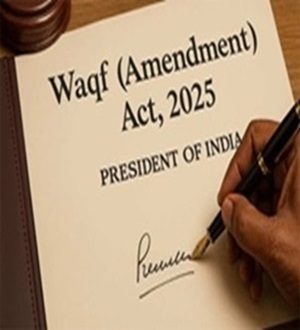Waqf Governance Post-Umeed Act, 2025: Challenges and Opportunities in Contemporary India
DOI:
https://doi.org/10.59698/quru.v3i3.486Keywords:
Religious Autonomy, Minority Rights, Federal Governance, Constitutional Challenges, Waqf PropertiesAbstract
This research paper examines the transformation of India’s Waqf Act, 1995 into the UMEED (Unified Waqf Management, Empowerment, Efficiency, and Development) Act 2025, analysing its implications for religious freedom, minority rights, and federal governance in India. The study traces the historical evolution of Waqf legislation from British colonial rule through independent India, highlighting how management of Muslim religious properties has been shaped by administrative needs and political considerations. The paper reveals that while the 2025 amendment aims to modernize Waqf administration through digital systems, enhanced transparency, and professional management, it fundamentally alters the nature of community control over religious endowments. Key changes include mandatory inclusion of non-Muslim members in Waqf boards, transfer of decision-making authority from community bodies to District Collectors, elimination of traditional oral Waqf practices, and centralized digital registration requirements. The research identifies significant constitutional challenges arising from these reforms, particularly regarding religious autonomy under Article 26, minority rights under Articles 29-30, and federal structure principles. The study concludes that while the Act addresses legitimate concerns about property mismanagement and corruption, its approach may undermine constitutional protections for minority communities and disrupt the delicate balance between modern governance requirements and traditional religious practices, potentially setting precedents for future interventions in religious institutions.
References
Abdullah, Mohammad. “A Critical Examination of Waqf Management Practices in India: Special Reference to Fiqh of Awqaf.” Available at SSRN 2213612, 2012.
Abderrazak Belabes, “The Forgotten History of the Waqf: The Kaʿaba” 2(3) Islamic History and Literature (2024).
Ahmad, Dr Tauseef. “Waqf Amendment Act 2025 and Its Impact on Muslim Endowments in India,” 2025.
Ali, Jawwad, Yousuf Azim Siddiqi, Nor Asiah Mohamad, and Rusni Hassan. “Shari’ah Heterogeneity of Indian Islamic Waqf Law (IIWL) and Accounting and Auditing Organization for Islamic Financial Institution (AAOIFI) Standard: A Comparative Study in Light of Classical Rulings.” Journal of Islamic Finance 12, no. 1 (2023): 96–108.
Government of India, Ministry of Minority Affairs, Report of the High-Level Committee on the Social, Economic and Educational Status of the Muslim Community of India (November 2006).
Jain, S N. “Doctrinal and Non-Doctrinal Legal Research.” Journal of the Indian Law Institute 24, no. 2/3 (1982): 341–61.
Khan, Foyasal, and M Kabir Hassan. “Financing the Sustainable Development Goals (SDGs): The Socio-Economic Role of Awqaf (Endowments) in Bangladesh.” In Revitalization of Waqf for Socio-Economic Development, Volume II, 35–65. Springer, 2019.
Mir, Javaid Ahmad. “Impact Assessment of UMEED (NRLM) on Rural SHG Women.” American Journal of Rural Development 5, no. 5 (2017): 121–22.
Mussalman Waqf Validating Act, 1913, Act No. VI of 1913.
M. Bhaskara Raj, “From Community Trust to State Oversight: The Evolution of Waqf Legislation in India” IJFMR (2025).
M. Hidayatullah & Arshad Hidayatullah, Mulla’s Principles of Mahomedan Law 152 (LexisNexis, 2016).
Ministry of Minority Affairs, Press Release on Introduction of the Waqf
Mohtesham, Mohammed Meeran Jasir, Syed Marwan, Abdul Hai, and Mohd Shahid. “An Assessment of Using Sukuk for Waqf Property Development in India.” Journal of Islamic Finance 10 (2021): 85–91.
Naseef, M K, and R Santhosh. “Waqf and Authority Dynamics: Reconfigurations of a Pious Institution in Colonial Malabar, South India.” Society and Culture in South Asia 8, no. 1 (2022): 51–71.
Ostagar, Abdul Motin. “Role of Waqf in Financial Inclusion: An Indian Overview.” ZENITH International Journal of Multidisciplinary Research 8, no. 12 (2018): 154–59.
Owais, Mohd, and Mohammad Qutaiba. “Cash Waqf in Poverty Reduction in India: Lessons from Selected Countries.” Talaa: Journal of Islamic Finance, 2023.
P. S. Munawar Hussain, Muslim Endowments, Waqf Law and Judicial Response in India (1st edn, Routledge, 2021).
Rasool, Tabasum. “Waqf Administration in India.” Journal of Islamic Thought and Civilization 7, no. 1 (2017): 1–12.
Ray, C. “Livelihoods for the Urban Poor: A Case Study of UMEED Programme in Ahmedabad.” Report. CEPT University, Ahmedabad 108 (2010).
Salman, Syed Ahmed, and Sheila Nu Nu Htay. “Introducing Waqf Based Takaful Model in India.” Tazkia Islamic Finance and Business Review 7, no. 2 (2012).
Shruti Saran and Aseem Chandra Paliwal, “Towards a Transparent Waqf System: Bridging Religious Autonomy and Legal Accountability in the Context of Property Rights” 8(2) International Journal of Law, Management and Humanities (2025).
The Constitution of India, 1950.
The Hindu, “Waqf Properties to be Digitized under New Act: Minority Affairs Ministry,” January 14, 2025.
The Islamic Jurisprudence and Historical Evolution of Waqf in India, available at: https://www.newageislam.com/islam-politics/ghulam-rasool-dehlvi-new-age-islam/the-islamic-jurisprudence-historical-evolution-waqf-india/d/135128 (last visited on July 31st, 2025).
Amendment Act 2025, Government of India, January 2025.
The Mussalman Waqf Act, 1923.
The Mussalman Waqf Validating Act, 1930.
The Waqf (Amendment) Act, 2013.
The Waqf Act, 1995.
The Waqf Amendment Act 2025.
The Waqf Act, 1954.

Downloads
Published
How to Cite
Issue
Section
License
Copyright (c) 2025 Shalini Shukla, Chandra Prakash Singh

This work is licensed under a Creative Commons Attribution-NonCommercial-ShareAlike 4.0 International License.
Quru': Journal of Family Law and Culture





.png)







